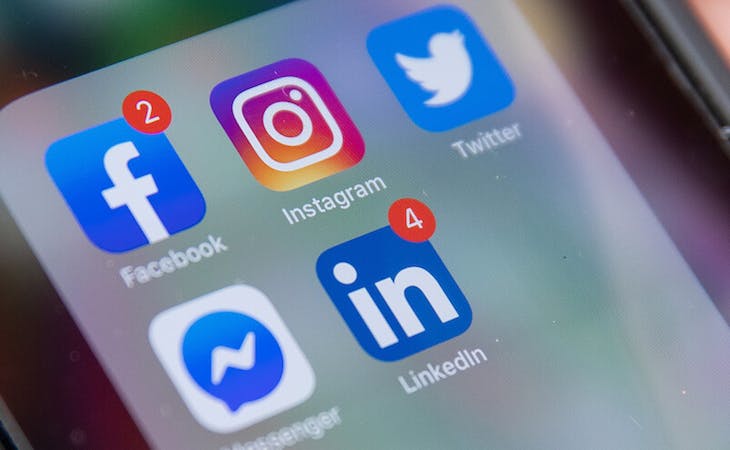I spend a lot of time on social media. Not only is it part of my job at Saatva to post on the company’s social media profiles, but I also use it to keep up with friends and family, see what my favorite celebrities are up to, and connect with other writers in my industry.
When the coronavirus pandemic hit the United States in March, I found myself spending even more time on social media than usual—to the detriment of my mental health and my sleep. I would scroll through Twitter for hours reading the news reports of how bad things were getting in New York City, where I live, and all of a sudden it was 1 a.m. and I was completely wired.
After a few months of living (and not really sleeping well) like this, I finally had enough and decided to take a break in June. I went cold turkey and did a week-long social media detox. Here’s what happened.
How going on a social media detox affected my sleep—and my life
As soon as I deleted Facebook, Twitter, and Instagram from my phone, I immediately felt freer. While I thought it would be difficult to not check in with the world multiple times a day, I quickly realized I wasn’t missing out on anything. I still texted with the friends and family members I wanted to stay in touch with during my week-long social media break.
During my social media detox, I replaced the time I usually spent checking all of my accounts on my phone—about six hours a day—with other, more relaxing activities like playing Animal Crossing, taking virtual dance cardio classes at 305 Fitness, and catching up on the last couple of seasons of Real Housewives of New York.
So how did this affect my sleep? Because I was no longer seeing stressful posts on social media, and I had nothing to mindlessly scroll through until the wee hours of the morning, I had a much easier time falling—and staying—asleep. I was also able to get back to a much more reasonable bedtime, around 11:30 p.m.
Besides the fact that I wasn’t exposing myself to as much stressful information—I did still read the news, I just didn’t get it from Twitter—I think part of the reason why I was able to get better sleep was that I wasn’t being exposed to sleep-disrupting blue light so close to bedtime.
Beyond improving my sleep, I felt more focused at work and in life in general. Without the Instagram app tempting me to open it just one more time during the workday, I was able to get more done and get it done more efficiently. Instead of monitoring my Twitter feed while I was watching a new episode of The Bold Type, I actually paid attention to the show, and I didn’t miss out on the small details I normally wouldn’t have picked up on.
With all of my new free time, I’ll admit that sometimes I felt bored. I kept wondering if I should be doing something, anything, to occupy my time since I’m someone who usually fills every waking moment with some sort of activity. But it was nice to give myself a mental break and just be able to chill out for a little while each day. (And research shows idle time can boost creativity.)
Although I’m back on social media now, I use it differently than I did pre-detox. I no longer have the urge to check my phone during the day, I log off a couple of hours before bedtime to avoid nighttime stress, and I make it a point to be more present while I’m doing other activities, whether that’s watching TV, eating dinner, or sitting in the park near my apartment. I’ve also unfollowed people who stress me out and followed accounts that make me happy—so now when I log onto Instagram, I mostly see recipes.
How to go on a social media detox
After my break was over, I called up Paige Rechtman, licensed psychotherapist in New York City (who’s done a social media detox herself), to get some general advice on cutting back on social media.
The good news is, you don’t need to go on a week- or month-long social media detox to reap the sleep and mental health benefits. Here are some simple guidelines for limiting your time on social media for better sleep and less stress:
- Start small. “Whatever a person is comfortable with is a great start,” says Rechtman. “Even if you put your phone away for 10 minutes, that can be a great way to center and ground yourself.”
- Have some relaxing replacement activities lined up. “It’s a good idea to have other stuff to do,” says Rechtman. Keep a novel or adult coloring book on hand, for example.
- But don’t be afraid to be bored. “If you find that you’re bored, let yourself be bored and see what comes up for you,” says Rechtman. “You can do other activities to distract yourself, but be brave enough to face the boredom and sit in it.”
- Set boundaries. “I recommend putting your phone in another room to charge it at night,” says Rechtman. She also suggests putting limits on how much time you can spend on each social media platform (there are apps that can help you do this) and unfollowing accounts that make your anxiety worse.
- Don’t be too hard on yourself. If you struggle to curb your social media use, that’s OK—we’re all addicted to our phones, points out Rechtman. “If you’re introducing this new habit of not looking at social media as much, it’s going to take some time to get used to it,” she says.




